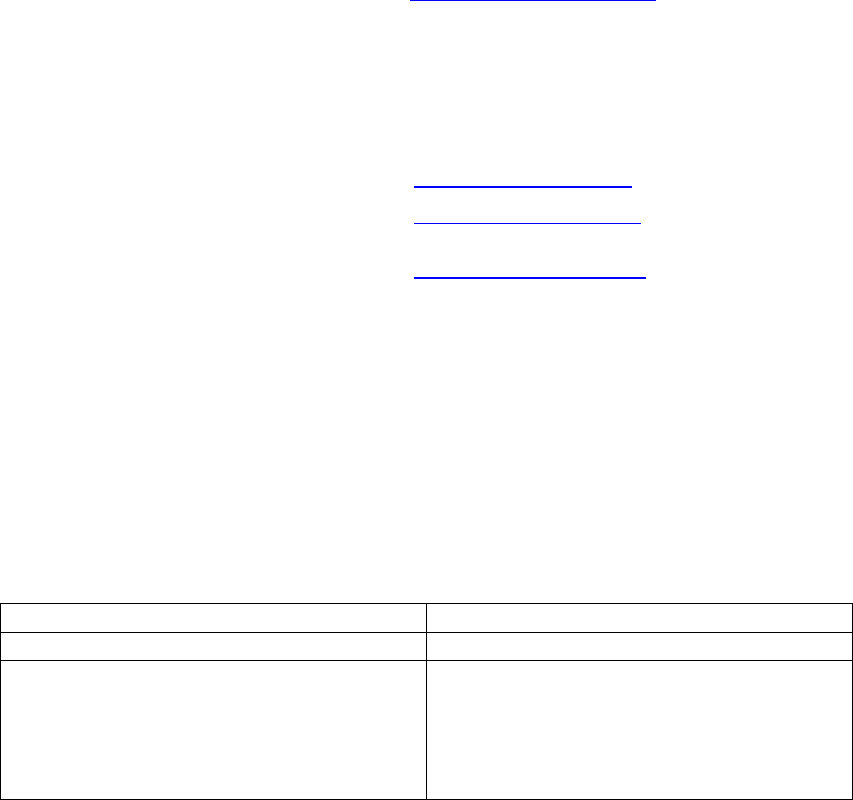
1
NCIs’
Whistleblowing
Policy

2
Whistleblowing
Aim – The National Institutions of the Church of England (NCIs) seek to act
with probity in their professional behaviour, and so aim to help the staff to
follow, and be seen to follow, the highest ethical and moral standards. Should
there be any failure in this, the policy seeks to enable staff to alert the
organisation to any potential problem or wrongdoing reasonably believed to
exist, without fear of any negative reprisal in response to the revelation (such
as fear of dismissal, denial of promotion or pay prospects, any other
detrimental treatment).
Summary – Staff must consider the reasonableness of suspicion and whether
informal action is appropriate. S/he may involve a senior colleague and should
alert a supervising member (“SM”, designated member of the Audit
Committee). The SM will undertake an investigation with the assistance of
Internal Audit (in serious cases others, such as forensic accountants or the
police, may be involved). The procedure is confidential. Any disciplinary action
that needs to be taken, will normally take place after the investigation. It is
possible to appeal the decision. Malicious, vexatious or frivolous use of the
process will result in disciplinary action. Management has a duty to follow up
the case to ensure appropriate controls are brought in to mitigate further,
similar problems.
Policy
Procedure
Scope and Purpose
Objectives
Principles
Process
Stage 1: Potential whistleblower considers reasonableness of suspicion
Stage 2: Raising the suspicion and initial investigation
Stage 3: Detailed investigation
Stage 4: Follow up to investigation
Guidance and Frequently Asked Questions
What is whistleblowing?
What is the difference between a complaint and whistleblowing?
Isn’t whistleblowing tittle-tattle/grassing up/being a sneak?
To whom do I blow the whistle?
What should I do in the first instance if I suspect wrongdoing?
What legal protection do I have when I whistle blow?
Will I be legally liable if I do not blow the whistle?
Why would an organisation encourage whistleblowing?
May I make an anonymous disclosure?
What will be the consequence for me?
What if I don’t trust the organisation/people to whom I might blow the
whistle? (either personally or because the malpractice may be at
management level)
Policy Info
Supervising Members Contact Details
Flowchart

3
WHISTLEBLOWING POLICY
As part of their duty to conduct affairs in a responsible and transparent way,
the NCIs aim to achieve best practice in corporate governance. It is generally
accepted that part of good governance and risk management involves having
an appropriate fraud response procedure, which may involve a whistleblowing
policy.
Whistleblowing is the disclosure by an employee to either his/her employer or
an appropriate regulatory body of suspected wrongdoing by anyone within the
workplace. Wrongdoing may include (but is not limited to):
- a criminal offence
- a breach of a legal obligation
- a miscarriage of justice
- a risk to the health and/or safety of an individual or individuals (be that
another employee, a customer, a member of the public or any other
person)
- damage to the environment
- deliberate concealment of any of the above
- a failure to comply with an element of stated corporate governance
policy or other compliance matter
- deliberate non-compliance, to the detriment of the organisation, with
that organisation’s stated policies/procedures or underhand dealings or
practices
In line with the Public Interest Disclosure Act 1998 (‘PIDA’) the NCIs wish to
encourage any employee in their management to alert them to any potential
problems reasonably believed to exist, without fear of any negative reprisal in
response to his/her revelation, be that fear of dismissal, denial of promotion or
pay prospects, or any other detrimental treatment.
Accordingly, the NCIs have put in place a system for the making of such
disclosures with the appropriate degree of discretion, ensuring the confidence
of all parties involved. It should be noted that this is one stage less formal
than the most serious step of making a formal representation directly to the
Audit Committee
1
.
The procedure also is an alternative to a variety of less formal mechanisms:
- discussion with your line manager;
- discussion with a senior manager;
- discussion with an internal auditor, HR manager or other relevant
professional.
1
This right only applies to the three NCIs that have audit committees (the Church
Commissioners (CC), the Archbishops’ Council (AC) and the Pensions Board (PB)). These
audit committees can in turn whistleblow to their governing bodies, and General Synod in the
case of the Archbishops’ Council’s audit committee, and the state office holders in the case of
the Church Commissioners’ audit committee.
4
Whistleblowing may be to an outside regulatory body, or even the police, in
some circumstances, though such action is clearly not covered by this policy.
However, this procedure may involve such bodies, where appropriate, further
down the line of inquiry and investigation.
A whistleblowing policy is different from disciplinary and/or grievance and/or
complaints (under equal opportunities) procedures. Advice on distinguishing
such matters is included in the guidance notes to this policy.
PROCEDURE
Scope and Purpose
The whistleblowing procedure applies to all employees in the direct
management of the NCIs including those on probationary service and
employees on secondment from other organisations. (Other procedures and
duties of care may dictate how members, staff from temporary employment
businesses and contractors should act in similar circumstances).
The procedure:
- provides a means of addressing conduct or behaviour or activities
which fall within the definition in the policy and on which an employee
may feel compelled to blow the whistle
- defines what may be done under the policy and by whom and sets out
important employee rights and obligations
- ensures that within each set of circumstances all employees are
treated consistently, fairly and equitably
- ensures that any disciplinary action in relation to disclosure of matters
in the policy is fair and reasonable in all the circumstances and is
applied equitably in every case
- may lead to further action, for example, of a disciplinary nature or an
internal review of procedures and controls.
Objectives
The objectives of the procedure are:
- for employees to be able to disclose without fear of reprisal any
suspicion of an activity that might be illegal or fraudulent or dangerous
to or of risk to the reputation of either an individual person or persons
or to the organisation as a whole. Once a reasonable suspicion has
been identified, it will be suitably investigated and, where necessary,
action taken
- to improve the control environment by providing a generic preventative
and detective control
- to ensure that instances of irregularity are dealt with
5
- to prevent allegations (especially false ones) from being publicised and
damaging the reputation of any of the NCIs.
Principles
- Staff should have a process available to them under which they may
alert the organisation to potential problems and raise any serious
concerns they may have.
- There may be circumstances where the employee is legally liable if
he/she does not blow the whistle these are in the case of certain
serious frauds or instances of professional malpractice (see FAQs).
- Once a disclosure is made, speed may be of the essence and all those
involved in the procedure should act without delay.
- Confidentiality is essential in the first instance, both to ensure
confidence in the fairness and probity of the process and so as not to
alert any potential wrong-doer to the suspicion, as this may lead to him
or her destroying evidence. Later on, confidentiality may be lifted (if
appropriate) to rectify the situation and to put in place processes to
minimise the risk of it recurring.
- Disciplinary action will not usually be taken against an employee
suspected of an activity falling within the procedure until the case has
been investigated and reasonable belief of the activity having taken
place has been established; however, there may be exceptions when
dismissal for gross misconduct or suspension is necessary prior to the
final result of an investigation and other ensuing procedures.
- Malicious, vexatious or frivolous use of the process will result in
disciplinary action against the employee invoking or seeking to invoke
the procedure.
- All proceedings, witness statements and records will be kept
confidential as far as is possible (see comments on disciplinary process
above).
- Management has a duty to ensure that all matters raised under the
policy are taken seriously.
- A policy is in place to provide a secure atmosphere in which staff feel
they may raise concerns without fear of reprisal.
Process
Stage 1: Potential whistleblower considers reasonableness of suspicion
1. An employee becoming aware of a situation which s/he suspects is an
activity about which he/she might blow the whistle under the policy,
should in the first instance consider if his/her grounds for suspicion are
reasonable. S/he should also consider whether he/she wishes to follow
up the suspicion with one of the more informal methods of investigation
or the most formal, representation directly to the Audit Committee.
6
2. If the employee chooses the whistleblowing policy as the most
appropriate mechanism for his/her concern (or the more informal
procedures have been tried and the result has proved unsatisfactory in
the eyes of the employee) before proceeding with approaching the
Supervising Member (see paragraph 5 below) the employee may, if
he/she wishes, raise the matter in confidence with his/her line manager
in the first instance. If, for whatever reason, he/she does not wish to
consult his/her line manager but nonetheless wants a second opinion,
a member of the relevant senior management team may be consulted
in confidence.
3. If the line manager or member of the relevant senior management
team (‘Senior Colleague’) is alerted under the policy, that Senior
Colleague should advise the employee in question in no more than five
working days whether he/she also considers the suspicion reasonable
and, also, that the use of the policy is appropriate in the circumstances.
The employee may still alert the Supervising Member even if his/her
Senior Colleague does not concur with his/her suspicion and/or feels
that invoking the policy will be inappropriate, provided he/she still
believes there are reasonable grounds for suspicion.
4. Whether or not the employee informs a Senior Colleague, a person
considering blowing the whistle must not prevaricate, make obvious
investigations or set any traps. It may prove detrimental to any further
investigations if the person believed to be involved in the wrongful
activity is approached.
Stage 2: Raising the suspicion and initial investigation
5. Once the employee (and any Senior Colleague consulted) believes
there are reasonable grounds for suspecting an activity falling within
the policy and that the use of the policy is appropriate, the employee
should alert one of the Supervising Members (‘SMs’). A number of
members of the NCI audit committees are available to be a Supervising
Member in a case of whistleblowing (details in the FAQs). They can be
contacted about an issue in any NCI (not just about the NCI on whose
audit committee they serve). The SM will take the basic details of the
concern and the whistleblower’s contact details. The SM will then
decide how the initial evaluation should be conducted (usually by
commissioning relevant staff or professional assistance), consider the
outcome and recommendations, and be briefed on the progress of any
subsequent investigation (challenging where necessary its adequacy
and conclusions). Usually at this point the relevant Chief Officer and
director / head of department will be informed that a whistleblowing
issue has arisen, but their involvement in the investigation may be
limited to being informed (this reflects the delicacy of the nature of a
whistleblowing investigation. More information will later be provided to
enable the introduction of new, stricter controls).

7
6. In most cases the SM will have an initial conversation with the
whistleblower for a basic assessment of the case, then request an
internal auditor to undertake any further interviewing of the
whistleblower, assessing the evidence and making a recommendation
on further action. These first steps should normally take place within a
few working days and those staff responsible will ensure that the
matter is considered as quickly as possible without affecting the quality
and depth of the investigations required. The whistleblower will be
informed of the result of the investigation, though there may be some
aspects which will remain confidential, for instance, certain aspects of
any resulting disciplinary proceedings.
7. If the SM decides that the matter should not be taken further but the
whistleblower is unhappy with the decision a desk review of the
documentation by the Chair, or some other member, of the Audit
Committee
2
followed by a one-to-one interview between him/her and
the whistleblower may take place.
8. If the case is still dismissed and the whistleblower is still dissatisfied,
he/she may use the most formal procedure of direct representation to
the whole Audit Committee
3
. In the light of having already had the
suspicion discounted after investigation, taking such a step should be
recognised as a serious allegation and spurious or vexatious claims
may result in disciplinary action.
Stage 3: Detailed investigation
9. If after the initial investigations there appear to be grounds for the
suspicion further work will take place. The police might be involved, or
in particularly complex cases experts, for example forensic
accountants, may be brought in if necessary. The investigations will still
be as swift as possible, as this will increase the chances of revealing
the wrongdoing.
10. As the result of finding any wrongdoing being perpetrated, the
appropriate disciplinary or other procedures will be brought into play as
and when necessary.
11. If the suspicion is ultimately found not to have grounds the
whistleblower may appeal as in paragraphs 7 and 8 above.
2
Only three of the NCIs have audit committees ( ,so the chair of the CCs’ audit committee will
cover appeals relating to Lambeth and Bishopthorpe Palaces and ABRC, the chair of the
AC’s audit committee will cover appeals relating to the National Society and Lambeth Palace
Library.
3
In those NCIs that have audit committees.
8
Stage 4: Follow up to investigation
12. After the investigations have taken place any necessary changes to
rectify errors resulting from the wrongdoing should be implemented if
possible.
13. If not already involved, the wrongdoer’s director / head of department
(and any other relevant staff) will, in consultation with Internal Audit and
other appropriate advisors, review the risks the situation has revealed,
and create new controls to combat these.
14. When appropriate thereafter, the (rest of the) Audit Committee, the
governing body and any other body responsible for the area of work
involved in the situation, will be alerted. Any other relevant reporting
body will also be informed. The Audit Committee’s annual report will
refer to the policy and may record whether or not it has been used in
the year.

9
GUIDANCE & FREQUENTLY ASKED QUESTIONS
What is whistleblowing?
Whistleblowing is the act of reporting officially and formally any suspected
wrongdoing or malpractice in the work environment.
What is the difference between a complaint and whistleblowing?
Essentially when someone blows the whistle, s/he is raising a disinterested
concern about something that affects the interests of others or of the
employer. Whistleblowing is an alert, and the whistleblower is not expected to
investigate further or prove the activity is taking place.
A complaint, conversely, normally relates to the person raising the issue
directly. It is usually due to poor treatment in breach of the person’s rights, or
bullying, and seeks to make redress. The person therefore has a vested
interest in the outcome of the complaint and will need to give evidence and
sometimes even prove his/her case.
The NCIs have separate procedures for grievances, discipline and complaints
(under equal opportunities criteria):
http://intranet/personel/policies/Grievance%20Procedure.doc
http://intranet/personel/policies/NCIs%27%20Disciplinary%20Procedure.doc
http://proxy_server/personel/policies/equal%20opps%20policy%20final.doc
If an employee is unsure as to which route to follow, the concern should
initially be raised with a Senior Colleague (see paragraphs 2 and 3 under the
heading ‘Process’ in the whistleblowing policy).
Isn’t whistleblowing tittle-tattle/grassing up/being a sneak?
No. Whistleblowing is an early warning system, and usually initiated by the
most loyal or public-spirited employees. Whistleblowing may save lives, jobs,
money and reputations. Whistleblowing might have prevented, or stopped
earlier, the Alder Hey Hospital scandal or the Enron collapse.
To whom do I blow the whistle?
One of the Supervising Members from the Audit Committees. Their contact
details are:
George Lynn (Church Commissioners’ Audit Committee)
Crown House
12 High Street
Bassingbourn
Royston
SG8 5NE
T: 01763 247523 (home) M: 07594131063

10
Jane Bisson (Church of England Pensions Board Audit & Risk Committee)
Glenhaven
La Rocque
Grouville
Jersey JE3 9BB
T: 01534 853162 M: 07797750896
Keith Malcouronne (Archbishops’ Council Audit Committee)
20 Riverside Road
STAINES
Middlesex
TW18 2LE
T: 01784 455501 M: 07990511905
Please note these are home details so please only contact members at a
reasonable hour.
What should I do in the first instance if I suspect wrongdoing?
Remember you are a witness not a complainant
Don’t use the process to pursue a personal grievance
Consider the possible risks and outcomes of any action you take
Do not approach the person involved (this may lead to him/her destroying
evidence)
Make sure your suspicion is supported by facts, don’t just allege
Remember that you may be mistaken or there may be an innocent or good
explanation – whistleblowing alerts, you do not need to prove anything,
though you will need reasonable grounds, and the alert is to the error, not the
reason for it (i.e. accidental or purposeful)
Do not become a private detective
Recognise the process may be complex and you may not be thanked
immediately and the situation may lead to a period of disquiet or distrust in the
organisation despite your having acted in good faith.
What legal protection do I have when I whistle blow?
The Public Interest Disclosure Act1998 (‘PIDA’)
(http://www.legislation.hmso.gov.uk/acts/acts1998/19980023.htm) protects
workers who blow the whistle in good faith. PIDA protects any employee with
reasonable grounds when alerting management to any potential problems
from negative reprisal in response to his/her revelation, be that dismissal,
denial of promotion or pay prospects, or any other detrimental treatment.
11
Will I be legally liable if I do not blow the whistle?
In some specific cases yes, for example, in some areas of serious fraud or in
other cases of professional malpractice (in-house solicitors, accountants,
auditors etc. should already know their legal responsibilities and for what acts
or omissions they can be held legally liable).
Why would an organisation encourage whistleblowing?
It detects and deters wrongdoing
It helps control risk
It demonstrates to stakeholders, customers and regulators that an
organisation is serious about good governance
It reduces the chance of anonymous or malicious leaks
It reduces the chance of a legal claim against the organisation (by ‘nipping
things in the bud’).
May I make an anonymous disclosure?
Yes, but it is much harder to investigate suspicions if reported anonymously
and sometimes impossible. It is best to declare your identity if you feel able to
do so. Staff should note:
Being anonymous does not stop others from successfully guessing who
raised the concern
It is harder to investigate the concern if people cannot ask follow-up questions
It is easier to get protection under the UK Public Interest Disclosure Act if the
concerns are raised openly
It can lead people to focus on the whistleblower, maybe suspecting that he or
she is raising the concern maliciously.
Staff are encouraged to put their names to any disclosures they make since
concerns expressed anonymously inevitably appear much less credible. For
this reason, anonymous disclosures under the whistleblowing policy will be
considered only at the discretion of the SM.
What will be the consequence for me?
You will not be blamed for speaking up or for any failure to speak up earlier.
You may have taken time to form your suspicions, or to build up the courage
to act on them. However, those who have been actively involved in wrong
doing will not have automatic immunity from disciplinary or criminal
proceedings.
If you make an allegation in good faith which is subsequently not confirmed by
an investigation, no action will be taken against you. In making a disclosure,
staff are expected to exercise due care in ensuring the accuracy and validity
of the information. If a member of staff makes malicious or vexatious
allegations, and particularly if these are persistently made, then further action
(including disciplinary action) may be taken.

12
What if I don’t trust the organisation/people to whom I might blow the
whistle? (either personally or because the malpractice may be at
management level)
Depending upon the activity you suspect there may be an appropriate
ombudsman, regulator or authority to report to. Or you may consult an
independent lawyer (which would be at your own expense), your trade
union/staff representative or the police. If the suspected wrongdoers are
senior management or the Chief Officer, you may choose the more formal
process of direct representation to the Audit Committee .
In the UK, there is also Public Concern at Work, an independent charity which
has played a leading role in putting whistleblowing on the governance agenda
and in influencing the content of legislation in the UK and abroad. Its
representatives can advise as to how to proceed (but are not an alternative
process as they are purely advisory): http://www.pcaw.co.uk/
Public Concern at Work, Suite 306, 16 Baldwins Gardens, London EC1N 7RJ
Telephone (general enquiries and
helpline):
020 7404 6609
Fax:
020 7404 6576
Email:
UK enquiries:
UK helpline:
UK services:
Policy Info
Policy Owner
Corporate Governance Group
Policy Monitoring
Internal Audit
Review Dates
Created ~2006
Updated August 2008
JWS August 2009
MC August 2012
July 2013

13
Whistleblowing Policy Process Flowchart
Employee becomes aware of an
activity they suspect falls under the
list of activities on which he/she may
blow the whistle. Must decide if
their grounds are reasonable.
Employee raises matter with
line manager/member of
senior management team (‘SC’
– Senior Colleague).
End of process
Employee (and/or SC) alert(s)
Supervising Member (‘SM’ – an
Audit Committee member
responsible for whistleblowing).
SM takes basic details.
SM (with Internal Audit assistance
where needed) does initial
assessment of case and decides
whether to proceed with process.
Employee decides whether to
appeal.
SM and Internal Audit and other
appropriate staff examine and
investigate case further, involving
any appropriate outside expertise.
AND suspected wrongdoer
interviewed, may be accompanied.
Counselling considered for exonerated
suspect.
Appropriate legal and/or disciplinary
and/or remedial action taken and/or
new controls introduced to reduce risk
of reoccurrence.
Employee decides whether to
blow the whistle nevertheless.
Formal Representation to the
Audit Committee (separate
process).
YES
YES
YES
NO
NO
This is a brief summary of the
whistleblowing and fraud process.
Please see the full policy text for
details.
UNSURE
YES
NO
NO
YES
NO
NO
YES
CONCERN UNSUBSTANTIATED
CONCERN SUBSTANTIATED
YES
SC considers whether
suspicion is reasonable.
Chair or other Audit Committee
member does desktop review
to consider reasonableness of
case and decides whether to
proceed.
Employee decides whether to
appeal.
Investigation comes to a close and
judgement made.
